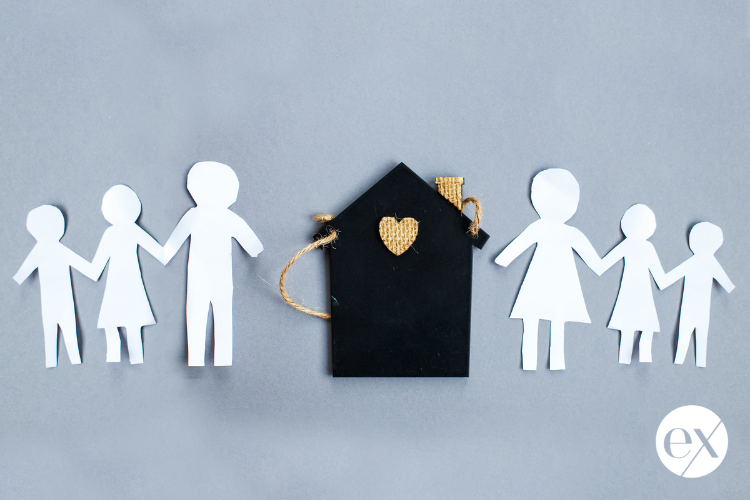
What do you do when you and your new partner both have kids? Do you introduce them all and try to merge? Or do you keep things separate so that you don’t add more stress to the relationship? Jennifer Hurvitz, relationship and dating coach and host of the podcast, Doing Relationships Right, has a unique perspective on blending families, to say the least. She unapologetically shares it with Jessica on the exEXPERTS’ Divorce etc… podcast.
Jennifer refers to blended families as “shaken families,” coined by Rebecca Eckler, author and friend. Turns out, the number of blended families that end in divorce is 72%. That’s a pretty daunting statistic.
So basically, kids ruin everything.
Kidding.
Just to be clear, this isn’t an anti-blending-under-any-circumstances PSA. You can blend, but here’s how. The couples that make it work are the ones going into blending knowing that it’s going to be a struggle. If you go into it thinking you’ll come out as the Brady Bunch, you’re going to fail. However you look at it, though, Jen just doesn’t believe in blending families. She is vocal about her opinion and knows that people have strong reactions to it. Jen just doesn’t feel that forcing children to merge with other children actually adds real value in a relationship. Instead, she adamantly believes that it causes undue pressure and strain on everyone – the kids because they’re being pushed into having to get along with and care about new kids that they really may not like or have anything in common with, and both of the adults because balancing your relationship amidst all of this can get in the way of your relationship.
Jennifer was in a former relationship where the guy made it known that he was looking for a new mom for his kids, both to her and the kids. She fell in love with his little girls, the girls fell in love with her – so when he cheated on her, the poor girls just didn’t have this assumed motherly figure in their lives.
First off, do we really have to say this is terrible way to go into any relationship or to talk to your kids? You just don’t set up your kids for the idea that you and they should be expecting a new mom or dad. Rather, you should talk to your kids about the idea that you’re now starting to date, but emphasize that you are NOT looking for someone to be a replacement parent. Setting your kids and new significant other up for that kind of expectation is a blazing red flag in and of itself.
The Pressure to Blend
Quite often, when people feel that they’ve met someone special and someone they see themselves marrying, they feel pressure to follow a more traditional model of living together full time, which includes blending families.
Jessica’s tried blending before. And she still believes today that 100% of the reason they broke up was because of the kids. The blending wasn’t successful, and the kids just didn’t get along well enough. Jessica and her partner were constantly being forced to choose between each other or their children. In Jessica’s view, ultimately, you’ve got to choose your kids.
Jennifer equates the idea of blending to a sleepover. Like okay, you’re there for a night and it’s fine, but you wouldn’t be able to find your way through that house in the dark like you would at your own home. But it’s okay because you were able to go back to the comfort of your own home the next morning. Imagine that feeling, that discomfort, for an extended period.
And the thing is, your kids, especially when they’re a little older and have their own stuff on their plate, probably don’t need the stress and hassle of meeting your significant other’s kids. They have enough going on and now they have to go meet someone they don’t feel the need to meet? There’s just no need to put that on them when it’s not necessary.
When Blending Works Too Well
An interesting flip side of blending is that there are times when it works and your partner loooves your kids. It’s sweet, and it’s nice to see someone caring for your kids as if they’re their own. Jessica also had that experience, and she recognizes that it’s really the exception to the norm, since it’s very hard to really love someone else’s kids as much as your own. But ultimately, even having a partner who truly loves your children, can also create challenges. In Jessica’s case, in situations where her kids would want to do certain things, her partner would then feel his opinion was equally as important as Jessica’s…but who has the final word?
But the thing is, they’re your kids. Not theirs. Jessica would tell him, yes you can give your perspective, but at the end of the day, Jessica says, “my opinion trumps your opinion.” Though he may want equal say, at the end of the day, that’s not the case. It’s different with the actual father of your children, but for a step-parent or new partner, it’s not always going to work that way.
The Blending of Home Life
So how do you deal with different parenting plans between you and your partner? How do you live in a house where their kids have to abide by certain rules, and your kids have their own rules? Jennifer recommends writing these rules down. Put them on the fridge. You say, “I don’t care what your rules are at your other house. At our house, these are the rules.”
Family meals are also vital. Doesn’t matter what meal you choose to eat together, just make sure the entire family unit is eating together at least once a day or as often as you can. This is a clear way to show that you’re all a united front, and there is no separation between you and your kids, and your partner and his/her kids.
Jennifer might be anti-blending, but if you do choose to blend, she emphasizes, “You have to be positive. You have to practice what you preach.” Because even though it’s going to be difficult, you can’t go in with a negative, pessimistic attitude. Kids always sense the underlying tension.
Know Your Options
What’s most important to note from this is that you’ve got options. For some, the unblended family might be the best option. Would this work for everyone? Probably not. But as long as you know you’re putting your kids first and doing what’s best for them, do what you have to do. Blend if you understand the risks, don’t blend if you don’t want to. Just know that this is ok – you don’t have to conform to what other people think is right. It has to be right for you.
Leave a Comment
You must be logged in to post a comment.










